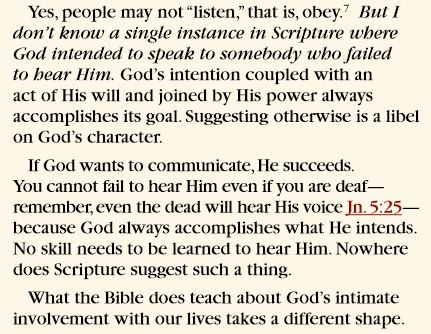Christian White Magic: Q and A, Part 2
We’ve explored six Christian white magic “spells” and Christian white magic definitions.
Now, what about some of the general questions or challenges, especially to the first article?
1. Doesn’t God want Christians to have health, wealth, or success?
 In Six Christian White Magic Spells Worse Than Fantasy Magic, I said the “health and wealth” gospel or “prosperity gospel” is a particularly bad Christian white magic system.
In Six Christian White Magic Spells Worse Than Fantasy Magic, I said the “health and wealth” gospel or “prosperity gospel” is a particularly bad Christian white magic system.
But doesn’t God want his people to find success, health, and potentially material wealth?
In Scripture, God reveals Himself as a loving and generous God who provides good gifts, often in response to his people’s inquiries. And the Old Testament book of Proverbs outlines principles about hard work, honesty, and other values that can lead to success.
I believe people can, if they ask God or try the Proverbs principles, often find responsibility and good work habits that can also lead to material success. However, these are general principles. They will not always work every time they’ve tried. Why not? Because this is not a perfect world. Ours is a sin-cursed age. So it would be a mistake to expect wealth/health/lack of struggle in every case. Injustice is very real. For example, Christians may face racism based on their ethnicity, or other prejudices based on their beliefs, regardless of their faith or work ethics.
Scripture does not support either materialism or the notion that material blessings are evil.
But we cannot therefore draw a magic formula: if we pray certain ways, or perform certain deeds, then God is obligated to increase his material or other blessings on us.
This did not work for Job. Or Elijah. Or Paul. Or any of the apostles. Or Jesus Christ himself.
What happens when the “magic” doesn’t work? Who gets the blame for a bad spell-casting?
Are we really Christians? Does God really love us? Does he fail to keep his promises?
Or might we question, as the disciples did about the man born blind, whether someone—whether himself or his parents—had brought that struggle into his life?1 In response to the apostles, Jesus is clear: no one sinned. The man was born blind apart from any lack of faith on his part. He was born blind to reveal God’s glory.
Jesus rejected a magical, causal, if/then system to suffering and to blessing. So should we.2
2. Doesn’t God want Christians to protect children from outside evils?
 I started to discuss Christian “protective circles” around certain people or environments, as if we can use special actions or methods to keep out the evil. Then Mike Duran finished it:
I started to discuss Christian “protective circles” around certain people or environments, as if we can use special actions or methods to keep out the evil. Then Mike Duran finished it:
What are “clean media spells”? They are practices that stem from the belief that G-rated, “family-friendly” content — films and fiction without sex, profanity, excessive violence, occult themes, etc. — is inherently “pure” (or, at least, purer than other fare), imparts a protective covering, cultivates holiness, does not morally corrupt, brings one closer to God (or, rather, keeps the devil and evil spirits away), and is ultimately “safer” than art with mature content.
While there’s much to commend such a stance, there’s also a great potential for “magic” in this thinking.3
Many of our readers have long since agreed this notion isn’t biblical. But any others who happen by might understandably raise this objection: Well, aren’t we supposed to keep evil influences away from our children—or way from other Christians who would be tempted?
To answer this question would take a book.4 But I have noticed many people who raise this question are not thinking of actual scenarios. They are thinking of hypothetical scenarios. For example: “If I talk about reading that fantasy novel, someone might be tempted toward the occult.”
But in Scripture, the apostle Paul does not talk about hypothetical, future-tense “someone out there might be tempted” scenarios. When he discusses how to handle legitimate issues of “weaker brothers,” who are tempted to sin by something other Christians do,5 he does not talk about someones. Instead, the apostle Paul refers to actual, present-day, personal, immediate situations his readers are experiencing.
So what would the difference look like? Perhaps something like this:
- Wrong: “Hey, you shouldn’t talk about your favorite fantasy novel out loud, ever. Someone out there someplace may hear you and be tempted to use that book to sin.”
- Right: “Hey, you shouldn’t talk about your favorite fantasy novel near him. He might hear you and, because of his struggle, could be tempted to use that book to sin.”
A similar principle could apply to parents. Your child might be tempted to use a thing to sin. But she also might not be. It depends on the child, who is a unique individual created by God with different desires, talents, strengths, and weaknesses. And as your child grows and becomes nearly a different person, she may find greater (or lesser) resistance to certain temptations—and greater potential for enjoying a gift, like a fantasy story, not for sinning but for God’s glory.
We cannot use magical methods to ward off possible bad results in the future. We can only practice biblical wisdom to respond with grace and truth to real people in our present lives.
3. Are you saying prayer and listening to God’s voice is ‘white magic’?
Prayer is not white magic, because God encourages us to pray! Our prayers can include requests for His good gifts, such as success and healing for the sake of His kingdom. He certainly does gives us richly for our needs and even beyond.
However, what if we believe we can train to pray better prayers to get the results we want?
What if we think we can train to hear God “praying” back to us, to give us regular daily guidance?
If we think this, we may have departed a biblical view of prayer and bought into white magic.
Apologetics author Greg Koukl, founder of Stand to Reason, makes a difference between:
- A biblical view of expecting to receive God’s guidance on occasion, via unexpected leadings or providential timing, versus
- An extra-biblical notion that if we practice some spiritual discipline, then we will be able to “decipher” the Spirit’s otherwise indistinct nudges or promptings every day.
As Koukl notes:6

Again, like Koukl, I don’t disagree with the idea that God could clearly reveal something to us on His own volition. But “train yourself to hear God’s guiding voice better as a regular, daily, occurrence” is arguably a white-magic method.
If you can do things to “generate” miracles regularly, isn’t this no longer a miracle?
Next week: We’ll wrap the series with three more challenges to the six Christian white magic spells.
- John 9:2. ↩
- Read more in articles like The Poison of the Prosperity Gospel, Randy Alcorn, Eternal Perspective Ministries. ↩
- Clean Fiction as Evangelical White Magic, Mike Duran, August 2016. ↩
- I’m actually working on such a book, with two coauthors. That’s an Easter egg just for readers who check the footnotes of SpecFaith articles. ↩
- Key passages include Romans 14 and 1 Corinthians 8-10. ↩
- Does God Whisper? Part 3, Greg Koukl, Stand to Reason Ministries. This page includes a link to a downloadable PDF of the group’s newsletter, in which the articles appeared. Koukl’s article is the third in a series, after part 1 and part 2. ↩







































